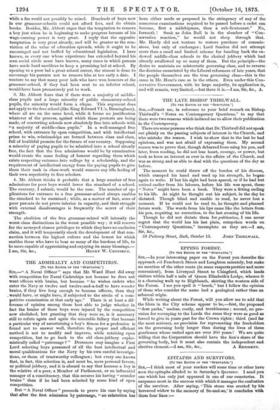THE ADMIRALTY AND COMPETITION.
[TO THE EDITOR OF THE "SPECTATOR."]
SIR,—"A Naval Officer" says that Mr. Ward Hunt did away with competition for Naval Cadetships not because he does not want officers with brains, but because " he wishes cadets who enter the Navy at twelve and twelve-and-a-half to have sounder brains, if they live long enough to become officers, than they -would have, or might have, if subjected to the strain of a com- petitive examination at that early age." There is at least a dif- ference of opinion among those best able to judge whether in fact the brains of these boys were injured by the competition now abolished, but granting that they were so, is it necessary still to refute again and again the miserable fallacy that because a particular way of ascertaining a boy's fitness for a profession is found not to answer well, therefore the proper and efficient method is not to modify and improve, while retaining open competition, but to go back to the old class-jobbery euphe- mistically called "patronage ? " Dreamers may imagine a First Lord selecting boys possessed of all the best intellectual and moral qualifications for the Navy by his own careful investiga- tions, or those of trustworthy colleagues ; but every one knows that, in fact, this selection is, and must be, mere personal favour, or political jobbery, and it is absurd to say that because a boy is the relative of a peer, a Member of Parliament, or an influential manager of a constituency, that this secures his having "sounder brains " than if he had been selected by some kind of open competition.
But "A Naval Officer" proceeds to prove his case by saying that after the first admission by patronage, " no relaxation has
been either made or proposed in the stringency of any of the numerous examinations required to be passed before a cadet can become, first a midshipman, then a sub-lieutenant." No, forsooth ! Sunk as John Bull is in the slumber of " Con- servative reaction," he would not sleep through that. Mr. Hardy did not venture to restore purchase of commis- sions, but only of exchanges ; Lord Sandon did not attempt more than a small and limited scheme for banding back the en- dowed middle-class schools to the clerical jobbery which had already swallowed up so many of them. But the principle—the desire to maintain an aristocratic governing class, and to reverse the doctrine enunciated by the Liberal reformers of late years, that the people themselves are the true governing class—this is the same in Mr. Hunt's case as in the others. Even under this Con- servative Government, with its large majority, its application is,. and will remain, very limited,—but there it is.—I am, Sir, &c., A.


































 Previous page
Previous page